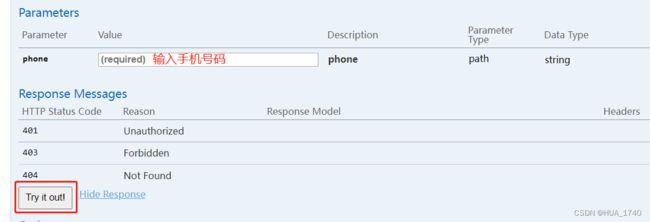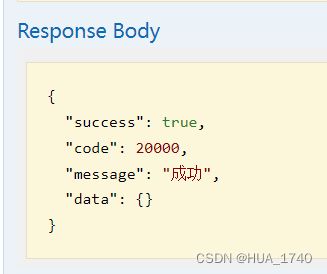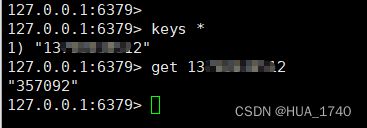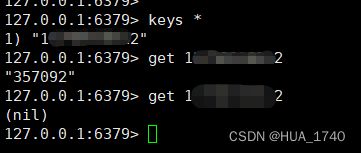Springboot+Redis接入腾讯云短信服务实现验证码发送
目录
一、开通腾讯云短信服务
二、代码实现
三、测试
申请阿里云短信服务需要以上线APP或已备案网站,腾讯云短信服务可以使用微信公众号申请,注册个人微信公众号比较方便,改用腾讯云短信服务,参考官方SDK文档实现验证码发送微服务模块。
一、开通腾讯云短信服务
具体流程在之前的博客:腾讯云短信服务申请+测试
二、代码实现
官方SDK文档 短信 Java SDK-SDK 文档-文档中心-腾讯云-腾讯云 (tencent.com)
1、通过Maven安装SDK
com.tencentcloudapi
tencentcloud-sdk-java
3.1.526
2、项目结构
微服务在线教育项目的其中一个模块用到短信验证,部分结构如图所示
3、编写application.properties
3.1 加入腾讯云短信服务相关参数
#腾讯云SMS参数 等号后面替换成自己腾讯云上的参数
tencentcloud.sms.secretId=xxxxxxxxxxxxxxxxxxxx
tencentcloud.sms.secretKey=xxxxxxxxxxxxxxxxxxxx
tencentcloud.sms.sdkAppId=xxxxxxxxxx
tencentcloud.sms.signName=xxxxxxxx
tencentcloud.sms.templateId=xxxxxxx3.2 加入Redis相关配置
spring.redis.host=redishost
spring.redis.port=6379
spring.redis.database= 0
spring.redis.timeout=18000004、编写工具类
4.1 Redis配置工具类
@EnableCaching
@Configuration
public class RedisConfig extends CachingConfigurerSupport {
@Bean
public RedisTemplate redisTemplate(RedisConnectionFactory factory) {
RedisTemplate template = new RedisTemplate<>();
RedisSerializer redisSerializer = new StringRedisSerializer();
Jackson2JsonRedisSerializer jackson2JsonRedisSerializer = new Jackson2JsonRedisSerializer(Object.class);
ObjectMapper om = new ObjectMapper();
om.setVisibility(PropertyAccessor.ALL, JsonAutoDetect.Visibility.ANY);
om.enableDefaultTyping(ObjectMapper.DefaultTyping.NON_FINAL);
jackson2JsonRedisSerializer.setObjectMapper(om);
template.setConnectionFactory(factory);
//key序列化方式
template.setKeySerializer(redisSerializer);
//value序列化
template.setValueSerializer(jackson2JsonRedisSerializer);
//value hashmap序列化
template.setHashValueSerializer(jackson2JsonRedisSerializer);
return template;
}
@Bean
public CacheManager cacheManager(RedisConnectionFactory factory) {
RedisSerializer redisSerializer = new StringRedisSerializer();
Jackson2JsonRedisSerializer jackson2JsonRedisSerializer = new Jackson2JsonRedisSerializer(Object.class);
//解决查询缓存转换异常的问题
ObjectMapper om = new ObjectMapper();
om.setVisibility(PropertyAccessor.ALL, JsonAutoDetect.Visibility.ANY);
om.enableDefaultTyping(ObjectMapper.DefaultTyping.NON_FINAL);
jackson2JsonRedisSerializer.setObjectMapper(om);
// 配置序列化(解决乱码的问题),过期时间600秒
RedisCacheConfiguration config = RedisCacheConfiguration.defaultCacheConfig()
.entryTtl(Duration.ofSeconds(600))
.serializeKeysWith(RedisSerializationContext.SerializationPair.fromSerializer(redisSerializer))
.serializeValuesWith(RedisSerializationContext.SerializationPair.fromSerializer(jackson2JsonRedisSerializer))
.disableCachingNullValues();
RedisCacheManager cacheManager = RedisCacheManager.builder(factory)
.cacheDefaults(config)
.build();
return cacheManager;
}
}
4.2 获取随机数
public class RandomUtil {
private static final Random random = new Random();
private static final DecimalFormat fourdf = new DecimalFormat("0000");
private static final DecimalFormat sixdf = new DecimalFormat("000000");
public static String getFourBitRandom() {
return fourdf.format(random.nextInt(10000));
}
public static String getSixBitRandom() {
return sixdf.format(random.nextInt(1000000));
}
}4.3 读取配置文件中的内容
@Component
@Data
public class SmsConstantUtils implements InitializingBean {
//读取配置文件内容
@Value("${tencentcloud.sms.secretId}")
private String secretId;
@Value("${tencentcloud.sms.secretKey}")
private String secretKey;
@Value("${tencentcloud.sms.sdkAppId}")
private String sdkAppId;
@Value("${tencentcloud.sms.signName}")
private String signName;
@Value("${tencentcloud.sms.templateId}")
private String templateId;
//定义公开静态常量
public static String SECRET_ID;
public static String SECRET_KEY;
public static String SDKAPP_ID;
public static String SIGN_NAME;
public static String TEMPLATED_ID;
@Override
public void afterPropertiesSet() throws Exception {
SECRET_ID=secretId;
SECRET_KEY=secretKey;
SDKAPP_ID=sdkAppId;
SIGN_NAME=signName;
TEMPLATED_ID=templateId;
}
}
5、接口SmsService
public interface SmsService {
boolean send(String phone, String param);
}
6、实现类SmsServiceImpl
注意: 这里导入腾讯云api的版本都是 com.tencentcloudapi.sms.v20210111.xxxx
@Service
@Slf4j
public class SmsServiceImpl implements SmsService {
@Autowired
private SmsConstantUtils smsConstantUtils;
@Override
public boolean send(String phone, String param) {
String phoneNumber = "+86" + phone;
String secretId = smsConstantUtils.getSecretId();
String secretKey = smsConstantUtils.getSecretKey();
String sdkAppId = smsConstantUtils.getSdkAppId();
String signName = smsConstantUtils.getSignName();
String templateId = smsConstantUtils.getTemplateId();
String[] phoneNumberSet = {phoneNumber};
String[] templateParamSet = {param.toString()};//对应模板中{1}
try {
/* 必要步骤:
* 实例化一个认证对象,入参需要传入腾讯云账户密钥对secretId,secretKey。
* 这里采用的是从环境变量读取的方式,需要在环境变量中先设置这两个值。
* 你也可以直接在代码中写死密钥对,但是小心不要将代码复制、上传或者分享给他人,
* 以免泄露密钥对危及你的财产安全。
* SecretId、SecretKey 查询: https://console.cloud.tencent.com/cam/capi */
Credential cred = new Credential(secretId, secretKey);
// 实例化一个http选项,可选,没有特殊需求可以跳过
HttpProfile httpProfile = new HttpProfile();
// 设置代理(无需要直接忽略)
// httpProfile.setProxyHost("真实代理ip");
// httpProfile.setProxyPort(真实代理端口);
/* SDK默认使用POST方法。
* 如果你一定要使用GET方法,可以在这里设置。GET方法无法处理一些较大的请求 */
httpProfile.setReqMethod("POST");
/* SDK有默认的超时时间,非必要请不要进行调整
* 如有需要请在代码中查阅以获取最新的默认值 */
httpProfile.setConnTimeout(60);
/* 指定接入地域域名,默认就近地域接入域名为 sms.tencentcloudapi.com ,也支持指定地域域名访问,例如广州地域的域名为 sms.ap-guangzhou.tencentcloudapi.com */
httpProfile.setEndpoint("sms.tencentcloudapi.com");
/* 非必要步骤:
* 实例化一个客户端配置对象,可以指定超时时间等配置 */
ClientProfile clientProfile = new ClientProfile();
/* SDK默认用TC3-HMAC-SHA256进行签名
* 非必要请不要修改这个字段 */
clientProfile.setSignMethod("HmacSHA256");
clientProfile.setHttpProfile(httpProfile);
/* 实例化要请求产品(以sms为例)的client对象
* 第二个参数是地域信息,可以直接填写字符串ap-guangzhou,支持的地域列表参考 https://cloud.tencent.com/document/api/382/52071#.E5.9C.B0.E5.9F.9F.E5.88.97.E8.A1.A8 */
SmsClient client = new SmsClient(cred, "ap-guangzhou", clientProfile);
/* 实例化一个请求对象,根据调用的接口和实际情况,可以进一步设置请求参数
* 你可以直接查询SDK源码确定接口有哪些属性可以设置
* 属性可能是基本类型,也可能引用了另一个数据结构
* 推荐使用IDE进行开发,可以方便的跳转查阅各个接口和数据结构的文档说明 */
SendSmsRequest req = new SendSmsRequest();
/* 填充请求参数,这里request对象的成员变量即对应接口的入参
* 你可以通过官网接口文档或跳转到request对象的定义处查看请求参数的定义
* 基本类型的设置:
* 帮助链接:
* 短信控制台: https://console.cloud.tencent.com/smsv2
* 腾讯云短信小助手: https://cloud.tencent.com/document/product/382/3773#.E6.8A.80.E6.9C.AF.E4.BA.A4.E6.B5.81 */
/* 短信应用ID: 短信SdkAppId在 [短信控制台] 添加应用后生成的实际SdkAppId,示例如1400006666 */
// 应用 ID 可前往 [短信控制台](https://console.cloud.tencent.com/smsv2/app-manage) 查看
req.setSmsSdkAppId(sdkAppId);
/* 短信签名内容: 使用 UTF-8 编码,必须填写已审核通过的签名 */
// 签名信息可前往 [国内短信](https://console.cloud.tencent.com/smsv2/csms-sign) 或 [国际/港澳台短信](https://console.cloud.tencent.com/smsv2/isms-sign) 的签名管理查看
req.setSignName(signName);
/* 模板 ID: 必须填写已审核通过的模板 ID */
// 模板 ID 可前往 [国内短信](https://console.cloud.tencent.com/smsv2/csms-template) 或 [国际/港澳台短信](https://console.cloud.tencent.com/smsv2/isms-template) 的正文模板管理查看
req.setTemplateId(templateId);
/* 模板参数: 模板参数的个数需要与 TemplateId 对应模板的变量个数保持一致,若无模板参数,则设置为空 */
req.setTemplateParamSet(templateParamSet);
/* 下发手机号码,采用 E.164 标准,+[国家或地区码][手机号]
* 示例如:+8613711112222, 其中前面有一个+号 ,86为国家码,13711112222为手机号,最多不要超过200个手机号 */
req.setPhoneNumberSet(phoneNumberSet);
/* 通过 client 对象调用 SendSms 方法发起请求。注意请求方法名与请求对象是对应的
* 返回的 res 是一个 SendSmsResponse 类的实例,与请求对象对应 */
SendSmsResponse res = client.SendSms(req);
//获取响应结果
SendStatus[] sendStatusSet = res.getSendStatusSet();
// 输出json格式的字符串回包
System.out.println(SendSmsResponse.toJsonString(res));
log.info("短信发送返回的响应:"+sendStatusSet);
return true;
} catch (TencentCloudSDKException e) {
log.error("腾讯云短信发送sdk调用失败:"+e.getErrorCode()+","+e.getMessage());
return false;
}
}
}6、Controller
@RestController
@Api(description = "腾讯云短信服务")
@RequestMapping("/edusms/sms")
@CrossOrigin //跨域
@Slf4j
public class SmsController {
@Autowired
private SmsService smsService;
@Autowired
private RedisTemplate redisTemplate;
@ApiOperation("发送短信")
@GetMapping(value = "/send/{phone}")
public R code(@PathVariable String phone) {
String code = redisTemplate.opsForValue().get(phone);
if(!StringUtils.isEmpty(code)) return R.ok();
String Vcode = RandomUtil.getSixBitRandom();
boolean isSend = smsService.send(phone, Vcode);
if(isSend) {
//验证码5分钟失效
redisTemplate.opsForValue().set(phone, Vcode,5,TimeUnit.MINUTES);
return R.ok();
} else {
return R.error().message("发送短信失败");
}
}
} 三、测试
使用Swagger进行测试 http://localhost:8005/swagger-ui.html
控制台输出
Redis中的数据
收到短信
五分钟后Redis中的数据失效






